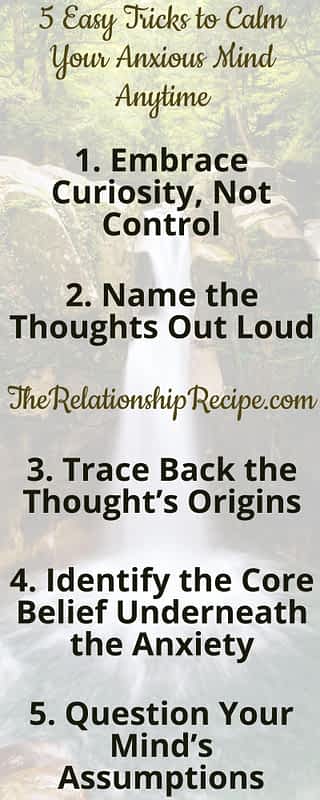5 Easy Tricks to Calm Your Anxious Mind Anytime
Trying to calm your anxious mind can be challenging at any time, but anxiety often happens at the most inconvenient moments. You might be trying to relax, and suddenly your brain churns out a worry you didn’t ask for. Maybe you have stress at work, or you are in a toxic relationship that you think you want to leave, but are afraid to.
Or you’re lying in bed, hoping for a good night’s sleep, but instead, your mind starts replaying worst-case scenarios on loop.
This is me. I even think of, and get anxious about, things from the past that could have happened, but didn’t.
Ridiculous!

I Know These Easy Anxiety Relief Methods Work
The logical side of me KNOWS it’s ridiculous, but my mind goes there anyway. It’s something that has plagued me my entire life, and I am so tired of it.
This frustration about my anxiety set me on a path to stop this waste of energy, once and for all. I had to dig deep into my thoughts, and identify why I was having them. I was determined to come up with a simple list of natural anxiety relief methods that I could use anywhere, anytime, and on the fly.
🚀The best part is, no one will have to know — no deep breathing exercises, etc. It will be between you, yourself, and no one else. Think of it like a secret superpower!
If any of this sounds familiar, you’re not alone. Everyone struggles to calm their anxious mind at times, and it can feel frustrating when standard advice doesn’t seem to work.
Fortunately, some effective, lesser-known, but highly effective, anxiety relief methods can help bring you back to calmness, and control in ways you may not have thought of, or tried before.

5 Simple Steps to Calm Your Anxious Mind
👉1. Embrace Curiosity, Not Control
Instead of trying to immediately control anxious thoughts, approach them with a curious mind. When you feel worry starting to build, ask yourself, “Why is this particular thought bothering me?” or “What am I really worried about here?”
Shifting into curiosity can make you feel less like a helpless bystander to your anxiety, and more like an observer of it.
Why it works: Anxiety often grows when you try to force it away. By bringing in curiosity, you send signals to the brain that you’re open to exploring the feeling instead of fighting it. This openness can calm your anxious mind and prevent it from spiraling out of control.
✨How to implement it: The next time you feel anxious, ask three questions:
- “What am I really feeling?”
- “Why is this coming up now?”
- “What would I tell a friend feeling this way?”
This is one of the simplest anxiety relief methods, and typically disrupts the anxiety cycle by introducing logic, and distance.

👉2. Name the Thoughts Out Loud
Anxiety can feel vague and overwhelming. Instead of letting thoughts swirl uncontrollably, try naming them directly.
For example, instead of feeling a general sense of dread about an upcoming project, pinpoint it: “I’m nervous about meeting the deadline.” Naming the thought brings it down to a manageable size.
✨Why it works: Naming anxious thoughts helps you create space between yourself and your worries, which can instantly make you feel more grounded. This practice is one of the simplest yet powerful anxiety relief methods, giving you clarity instead of chaos.
✨How to implement it: When a thought pops up, say it out loud or write it down in just a few words. If you’re anxious about a big event, for example, try saying, “I’m feeling nervous about how I’ll perform.” This practice helps remove the mystery that fuels anxiety.

👉3. Trace Back the Thought’s Origins
Anxiety has a habit of resurfacing as repetitive patterns. Instead of treating every anxious thought as brand-new, get to the root of where it’s coming from.
Ask yourself, “Where have I felt this before?” and “Is this reaction based on current events, or am I responding to a past experience?”
✨Why it works: By pinpointing a thought’s origins, you may realize that some anxieties are based on past fears, not current reality. Realizing this helps your brain recognize that not every fear is relevant to the present, making it easier to calm your anxious mind.
✨How to implement it: Each time a repetitive worry appears, examine it by asking, “Where did this thought come from?” If it’s a recurring worry from the past, acknowledge that it may not be as relevant as it feels. This clarity can reduce anxiety over time.

👉4. Identify the Core Belief Underneath the Anxiety
Anxious thoughts often stem from core beliefs that we’ve held onto, sometimes without realizing it. For instance, if you feel a lot of social anxiety, the core belief might be “I’m not good enough,” or “People will judge me.”
Recognizing these beliefs can help you understand why certain situations trigger you and can make anxiety feel less intense.
✨Why it works: Core beliefs are usually the culprit at the root of automatic thoughts and reactions. Once you bring them to the surface, you can work on reframing or challenging them. This awareness is one of the most powerful anxiety relief methods, as it allows you to replace outdated beliefs with more supportive ones.
✨How to implement it: Ask yourself, “What does this anxiety say about my beliefs?” If public speaking makes you feel anxious, maybe your belief is “I’ll embarrass myself.” Once you recognize the belief, you can remind yourself that this belief isn’t necessarily true.

👉5. Question Your Mind’s Assumptions
Anxiety thrives on assumptions—often irrational ones. It might assume that every small mistake will lead to disaster or that everyone around you is judging you negatively. When these assumptions arise, make a habit of questioning them.
✨Why it works: By challenging assumptions, you reduce anxiety’s power to turn small issues into overwhelming fears. This mental check-in allows you to stay in reality, separating facts from fiction, and easing anxiety’s grip on your mind.
✨How to implement it: Every time you notice an anxious thought, add “Is this true?” or “Is there real evidence for this?” For example, “I’ll definitely fail this project…Is that true?” Usually, you’ll realize that these assumptions lack substance, helping you calm your anxious mind by keeping it grounded.

Final Thoughts on The Ways to Calm Your Anxious Mind
Anxiety can take control quickly, but it doesn’t have to. With these practical and refreshingly simple anxiety relief methods, you can calm your anxious mind and bring yourself back to clarity whenever you need it most.
Anxiety thrives on automatic, unchecked reactions, but by pausing, questioning, and redirecting, you take charge of your mind instead of letting it run wild.
This post may contain affiliate links. I earn from qualifying Amazon purchases at no extra cost to you. This content is for informational purposes only and is not a substitute for professional advice. Read full disclaimer.
Thank you for reading this post, don't forget to subscribe!







